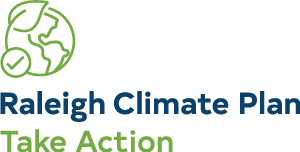Transportation is one area where individuals can make a difference to reduce their greenhouse gas (GHG) emissions and contribution to climate change. In Raleigh, transportation contributes to about 52% of total community GHG emissions. Personal gas-powered cars are responsible for most of these emissions.
According to our Community Climate Action Plan (CCAP) modeling, switching to forms of transportation other than cars and increasing dense development can reduce up to 75,000 metric tons of CO2e (carbon dioxide equivalent, the standard GHG emissions measure) per year in Raleigh. That’s almost as much energy as 10,000 homes use per year on average!
Walking, biking, and taking the bus are effective ways to reduce the energy needed and carbon emitted to power our transportation. These modes of transportation can reduce air pollution and also save money given the high costs of cars, maintenance, parking, and gas.
In fact, electric bicycles (e-bikes) are one of the most-quickly growing mobility options in the United States. They allow people to quickly commute and are easy to park and store. Plus, e-bike users can transport small children and items like groceries.
In 2024, Raleigh staff launched a pilot program providing point-of-sale vouchers to incentivize residents to purchase e-bikes.
The city has over 80 miles of bike lanes. See them below and learn more here:
Learn more about biking in Raleigh.
Another way to reduce your carbon emissions from transportation is to ride the bus. The map below shows GoRaleigh bus stations throughout the city.
It’s easy to get around by bus to most parts of Raleigh and our neighboring cities. Learn about how to ride here. No need to wait long at the stop, you can track buses and pay fares on our mobile app.
We’re also working to make it even easier and faster to get around Raleigh. Many routes now have only 15 minutes between buses, meaning wait time is low. We’re also building a network of bus rapid transit lines, where buses have their own lanes much of the way and where boarding at stations, not stops, is quick and easy!
Want to track your carbon emissions? You can use NREL OpenPATH to track how much carbon you are emitting depending on how you travel, like whether you are walking, biking, taking a bus or driving a car.
Learn more about getting around sustainably and how we are designing Raleigh to support these alternative forms of transportation.
